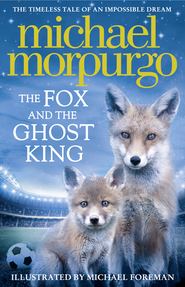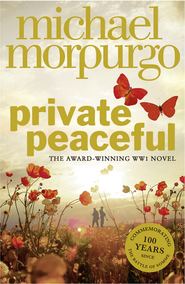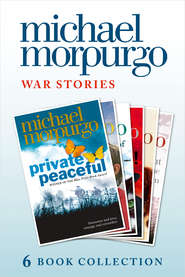По всем вопросам обращайтесь на: info@litportal.ru
(©) 2003-2024.
✖
World War One Collection: Private Peaceful, A Medal for Leroy, Farm Boy
Настройки чтения
Размер шрифта
Высота строк
Поля
“Was it you?” I asked Molly.
“Maybe,” she said, smiling, “and maybe not.” I wanted to kiss her again then, but I didn’t dare. That has always been my trouble. I’ve never dared enough.
Mother had it all arranged before I left school. I was to go and work with Charlie up at Mr Cox’s farm. Farmer Cox was getting on in years and, with no sons of his own, was in need of more help on the farm. He was a bit keen on the drink too, Charlie said. It was true. He was in the pub most evenings. He liked his beer and his skittles, and he liked to sing, too. He knew all the old songs. He kept them in his head, but he’d only sing if he’d had a couple of beers. So he never sang on the farm. He was always rather dour on the farm, but fair, always fair.
I went up there mostly to look after the horses at first. For me it couldn’t have been better. I was with Charlie again, working alongside him on the farm. I’d put on a spurt and was almost as tall as him by now, but still not as fast, nor as strong. He was a bit bossy with me sometimes, but that didn’t bother me — that was his job after all. Things were changing between us. Charlie didn’t treat me like a boy any more, and I liked that, I liked that a lot.
The newspapers were full of the war that had now begun, but aside from the army coming to the village and buying up lots of the local farm horses for cavalry horses, it had hardly touched us at all. Not yet. I was still Charlie’s postman, still Molly’s postman. So I saw Molly often, though not as often as before. For some reason the letters between them seemed less frequent. But at least with me now working with Charlie for six days a week we were all three together again in a kind of way, linked by the letters. Then that link was cruelly broken, and what followed broke my heart, broke all our hearts.
I remember Charlie and I had been haymaking with Farmer Cox, young buzzards wheeling above us all day, swallows skimming the mown grass all about us as the shadows lengthened and the evening darkened. We arrived home later than usual, dusty and exhausted, and hungry, too. Inside we found Mother sitting upright in her chair doing her sewing and opposite her Molly and, to our surprise, her mother. Everyone in the room looked as grim-faced as Molly’s mother, even Big Joe, even Molly whose eyes I could see were red from crying. Bertha was howling ominously from outside in the woodshed.
“Charlie,” said Mother, setting her sewing aside. “Molly’s mother has been waiting for you. She has something she wants to say to you.”
“Yours, I believe,” said Molly’s mother, her voice as hard as stone. She handed Charlie a packet of letters tied up with a blue ribbon. “I found them. I’ve read them, every one of them. So has Molly’s father. So we know, we know everything. Don’t bother to deny it, Charlie Peaceful. The evidence is here, in these letters. Molly has been punished already, her father has seen to that. I’ve never read anything so wicked in all my life. Never. All that love talk. Disgusting. But you’ve been meeting as well, haven’t you?”
Charlie looked across at Molly. The look between them said it all, and I knew then that I had been betrayed.
“Yes,” said Charlie.
I couldn’t believe what he was saying. They hadn’t told me. They’d been meeting in secret and neither of them had told me.
“There. Didn’t I tell you, Mrs Peaceful?” Molly’s mother went on, her voice quivering with rage.
“I’m sorry,” said Mother. “But you’ll still have to tell me why it is they shouldn’t be meeting. Charlie’s seventeen now, and Molly sixteen. Old enough, I’d say. I’m sure we both had our little rendezvous here and there when we were their age.”
“You speak for yourself, Mrs Peaceful,” Molly’s mother replied with a supercilious sneer. “Molly’s father and I made it quite plain to both of them. We forbade them to have anything to do with each other. It’s wickedness, Mrs Peaceful, pure wickedness. The Colonel has warned us, you know, about your son’s wicked thieving ways. Oh yes, we know all about him.”
“Really?” said Mother. “Tell me, do you always do what the Colonel says? Do you always think what the Colonel thinks? If he said the earth was flat, would you believe him? Or did he just threaten you? He’s good at that.”
Molly’s mother stood up, full of righteous indignation. “I haven’t come here to argue the toss. I have come to tell of your son’s misdemeanours, to say that I won’t have him leading our Molly into the ways of wickedness and sin. He must never see her again, do you hear? If he does, then the Colonel will know about it. I’m telling you the Colonel will know about it. I have no more to say. Come along, Molly.” And taking Molly’s hand firmly in hers she swept out, leaving us all looking at one another and listening to Bertha still howling.
“Well,” said Mother after a while. “I‘ll get your supper, boys, shall I?”
That night I lay there beside Charlie not speaking. I was so filled with anger and resentment towards him that I never wanted to speak to him again, nor to Molly come to that. Then out of our silence he said: “All right, I should’ve told you, Tommo. Molly said I should tell you. But I didn’t want to. I couldn’t, that’s all.”
“Why not?” I asked. For several moments he did not reply.
“Because I know, and she does too. That’s why she wouldn’t tell you herself,” Charlie said.
“Know what?”
“When it was just letters, it didn’t seem to matter so much. But later, after we began seeing each other … we didn’t want to hide it from you, Tommo, honest. But we didn’t want to hurt you either. You love her, don’t you?” I didn’t answer. There was no need. “Well, so do l, Tommo. So you’ll understand why I’m going to go on seeing her. I‘ll find a way no matter what that old cow says.” He turned to me. “Still friends?” he said.
“Friends,” I mumbled, but I did not mean it.
After that no more was ever said between us about Molly. I never asked because I didn’t want to know. I didn’t want even to think about it, but I did. I thought about nothing else.
No one could understand why, but shortly after this Bertha began to go missing from time to time. She hadn’t wandered off at all until now; she’d always stuck close to Big Joe. Wherever Big Joe was, that’s where you’d be sure to find Bertha. Big Joe was frantic with worry every time she went off. She’d come back home in the end of course, when she felt like it, either that or Mother and Joe would find her somewhere all muddied and wet and lost, and they’d bring her home. But the great worry was that she’d start chasing after sheep or cows, that some farmer or landowner would shoot her, as they’d shoot any dog they found trespassing on their land that could be molesting their animals. Fortunately Bertha didn’t seem to go chasing sheep, and anyway up until now she had never been gone that long, nor strayed too far.
We did our very best to keep her from wandering. Mother tried shutting her in the woodshed, but Big Joe couldn’t stand her howling and would let her out. She tried tying her up, but Bertha would chew at the rope and whine incessantly so that in the end Big Joe would always take pity and go and untie her.
Then, one afternoon. Bertha went missing again. This time she did not come back. This time we could not find her. Charlie wasn’t about. Mother and Big Joe went one way looking for her, down towards the river, and I went up into the woods, whistling for her, calling for her. There were deer to be found up in Ford’s Cleave Wood, and badgers and foxes. It would be just the sort of place she’d go. I’d been an hour or more searching in the woods with not a sign of her. I was about to give up and go back — perhaps she’d gone home anyway by now, I thought — when I heard a shot ringing out across the valley. It came from somewhere higher in the woods. I ran up the track, ducking the low slung branches, leaping the badger holes, dreading, but already knowing what I would find.
As I came up the rise I could see ahead of me the chimney of Father’s old shack, and then the shack itself at the side of the clearing. Outside lay Bertha, her tongue lolling, the grass beside her soaked with blood. The Colonel stood looking down at her, his shotgun in his hands. The door of the shack opened and Charlie and Molly were standing there frozen in disbelief and horror. Then Molly ran over to where Bertha lay and fell to her knees.
“Why?” she cried, looking up at the Colonel. “Why?”
(#ulink_c5079fb9-3ac2-5a3a-b329-fc45d1751226)
There’s a sliver of a moon out there, a new moon. I wonder if they’re looking at it back home. Bertha used to howl at the moon, I remember. If I had a coin in my pocket, I’d turn it over and make a wish. When I was young I really believed in all those old tales. I wish I still could believe in them.
But I mustn’t think like that. It’s no good wishing for the moon, no good wishing for the impossible. Don’t wish, Tommo. Remember. Remembrances are real.
We buried Bertha the same day, where Big Joe always buried his creatures, where the mouse had been buried, at the bottom of the orchard. But this time we said no prayers. We laid no flowers. We sang no hymns. Somehow none of us had the heart for it. Perhaps we were all too angry to grieve. Walking back through the trees afterwards, Big Joe was pointing upwards and asking Mother if Bertha was up in Heaven now with Father. Mother said that she was. Then Big Joe asked if we all go up to Heaven after we die.
“Not the Colonel,” Charlie muttered. “He’ll go downstairs where he belongs, where he’ll burn.” Mother darted a reproving glance at him for that.
“Yes, Joe,” she went on, her arm around him. “Bertha’s up in Heaven. She’s happy now.”
That evening Big Joe went missing. None of us was that worried, not at first, not while it was still light. Big Joe would often go wandering off on his own from time to time — he’d always done that — but never at night, because Big Joe was frightened of the dark. Our first thought was to look down in the orchard by Bertha’s grave, but he wasn’t there. We called, but he didn’t come. So, as darkness fell and he still had not come home, we knew there was something wrong. Mother sent Charlie and me out in different directions. I went down the lane calling for him all the way. I went as far as the brook where I stood and listened for him, for his heavy stomping tread, for his singing. He sang differently when he was frightened, no tunes or songs, but instead a continuous wailing drone. But there was no drone to be heard, only the running of the brook, which always sounded louder at night. I knew Big Joe must be very frightened for it was by now quite dark. I made my way home, hoping against hope that either Charlie or Mother might have found him.
As I came into the house I could see neither of them had. They looked up hopefully at me as I came in. I shook my head. Out of the silence that followed Mother made up her mind what had to be done. We didn’t have any choice, she said. All that mattered was finding Big Joe, and for that we needed more people. She would go up to the Big House right away to ask for the Colonel’s help. She sent Charlie and me up to the village to raise the alarm. We knew the best place to go was the pub, that half the village would be in The Duke in the evening. They were singing when we got there, Farmer Cox in full voice. The hubbub and the singing took a while to die down as Charlie told them. By the time he had finished they were all listening in absolute silence. Afterwards, not one of them hesitated. They were putting on hats, shrugging on coats and heading homewards to search their farms, gardens and sheds. The vicar said he’d gather everyone he could in the village hall to organise a search around the village itself, and it was agreed the sounding of the church bell would be the signal that Big Joe had been found.
Вы ознакомились с фрагментом книги.
Приобретайте полный текст книги у нашего партнера:
Приобретайте полный текст книги у нашего партнера:











